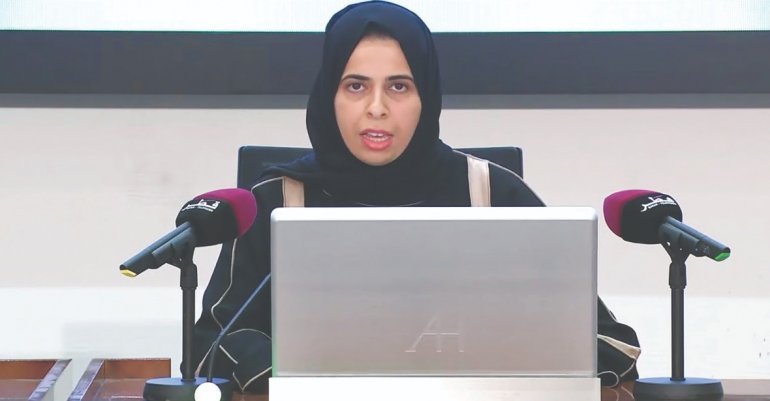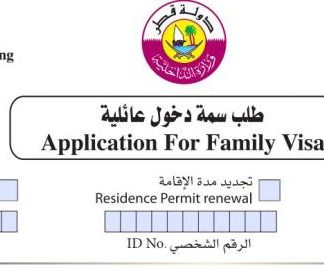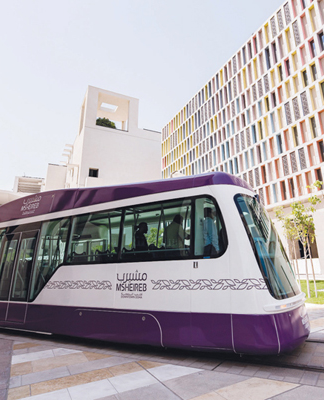
The Peninsula Online
DOHA: H E Lolwah bint Rashid bin Mohammed Al Khater, Assistant Foreign Minister and Spokesperson of the Supreme Committee for Crisis Management has said that out of total COVID-19 cases in Qatar, 84% cases were traced from inside quarantine.
“About 16 percent cases (in Qatar) were recorded out of quarantine, 84 percent cases were found inside quarantine. It means the mechanism of quarantine and idea of quarantine practice is working well,” said H E Al Khater.
Regarding the severity of the infection, H E Al Khater said that 89 percent cases of infection are mild, three percent cases are critical and eight percent cases of recoveries have also been recorded.
“Unfortunately there are two cases of death recorded, who were over 55 year. One was aged 56 suffering from chronic diseases like blood pressure and diabetes and other 58, suffering from renal failure,” said Al Khater.
She said that 12 cases of infection were discharged from ICU, only 37 cases are still admitted in ICU.
H E Lolwa Al Khater said that the increase in the number of cases of infection with coronavirus in recent time, according to the data available, is caused by two main reasons – the first reason is the returning of Qatari citizens that too in growing number.
The second reason, she said, is technical, which is the use of the new device for detecting the cases of infection which is more accurate enabling to screen and analyze more cases in record time.
“We can say about the increase in cases of infection but at the same time it could be seen from another aspect as an increase in detection of the cases which existed in fact, therefore it should be taken logically and scientifically,” said Al Khater.
She said the number of infected cases in Qatari citizens increased, however, it is stable in the expatriates. “Among Qatari citizens who came from abroad showing the symptom of infection so they will have to follow the instructions with self-isolation to protect themselves and others from the infection,” said Al Khater.
She said that Qatar is using only those devices which were found effective through laboratory test scientifically and certified by the World Health Organization (WHO) and the agencies concerned in some countries.
“Some countries have chosen the devices which are under experiments and different ways of screening which are known for less accuracy rate, so they might record less cases,” said Al Khater.
She said that for example, if there are 10 cases of infections, such devices can detect only four to five cases.
“Qatar does not follow this methodology but the best safest way proved scientifically and medically,” said Al Khater.
H E Lolwah bint Rashid bin Mohammed Al Khater, Assistant Foreign Minister and Spokesperson of the Supreme Committee for Crisis Management has said that the Ministry of Public of Health received more than 43,000 calls through hotline number 16,000 within three weeks.
She also said that the response rate to calls is 92 percent, and the average response time is 5 seconds, and the average satisfaction of people is 90 percent. Regarding the hotline’s languages, she said that there are five languages, including Arabic, English and other Asian languages.
For the team that handles the response, she said, in a press conference held yesterday, that it consists of 201 people, including many doctors.
H E Lolwah bint Rashid bin Mohammed Al Khater, said that it was decided to extend the decision to suspend incoming flights to Doha, with the exception of transit and air cargo.
She also noted that Qataris and children of Qataris, and their wives and permanent residency owners can come at any time they want, but should go first to health quarantine for 14 days. “Also before coming to Qatar they should notify Qatar’s embassies 72 hours ago in the countries from which they are coming so that necessary arrangements can be made.”
She said that in order to preserve the safety of the closed part of the Industrial Area and the safety of society, it was decided to extend the closure of that area while ensuring the continued flow of food and medical supplies. She also mentioned that there are three mobile medical units for examination, 6 ambulances and three clinics to deal with other cases in the Industrial Area.
H E Al Khater also said that there is a team working throughout the week and deals with cases of violations. They consist of several bodies in the country, including the Ministry of Public Health, the Ministry of Interior, the Ministry of Municipality and Environment, and others.
About the complaints she said that they received 7000 calls regarding quarantine complaints during the last period and 1160 complaints about gathering violations.
On the consumer and companies’ side, she said that they registered 304 complaints about commercial and consumer complaints, adding that the goal is to maintain prices stable in addition to quality.
About the supply of sterilizers and masks, she said there about 2 million mask and 2,66,000 litres of sterilizers are available in the country. “Qatar also is working on manufacturing and not just on imports,” she added.
She said that the cases of infection in women were recorded 11 percent and 89 percent in male. “If we divide it in Qataris and expatriates, the cases of infection in Qatari female citizens are 47 and men 65 cases. In expatriates, 48 cases of infection only in women and 675 cases in men expatriates,” said Al Khater.
She said that most of the infected cases, 31 percent are from the age group ranges from 25 to 34, and 25 percent cases of infection from 35 to 44 years.
“As much as 18 percent cases are from 45 to 54 and 10 percent are 55 to 64 and only three percent are above 64. The good thing in this matter is that the infected people above 55 are about 13 percent because they need more care with the age,” said Al Khater.
She said that the statistics showed 70 percent recovery in infected males and 21 percent in female.
“Over 39 percent of recovered cases aged from 25 to 34 and 25 percent of recovered cases are aged 45 to 54,” said Al Khater. She said that about 5.6 percent recovered people aged 55 to 64 and 5.7 percent recovered people were above 64.






























